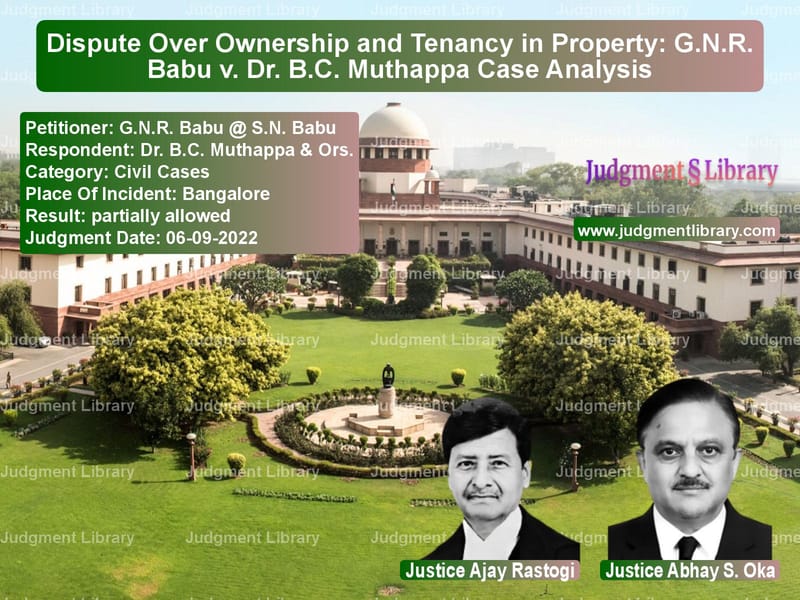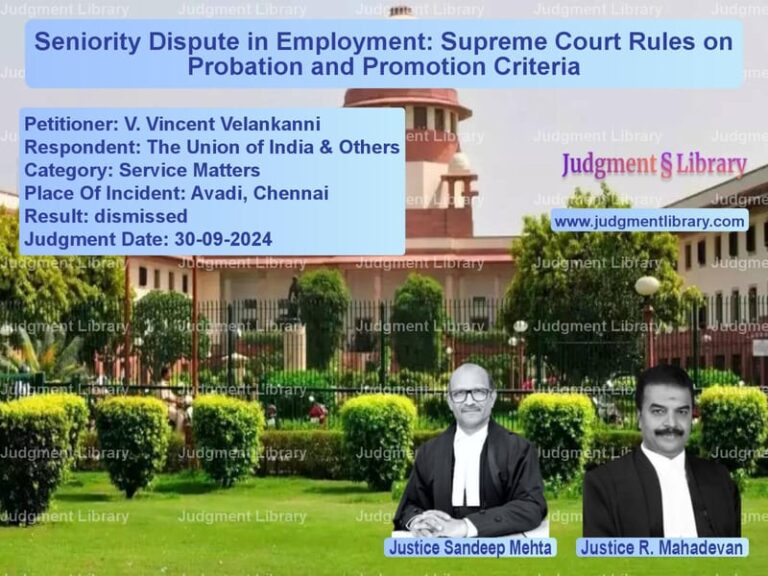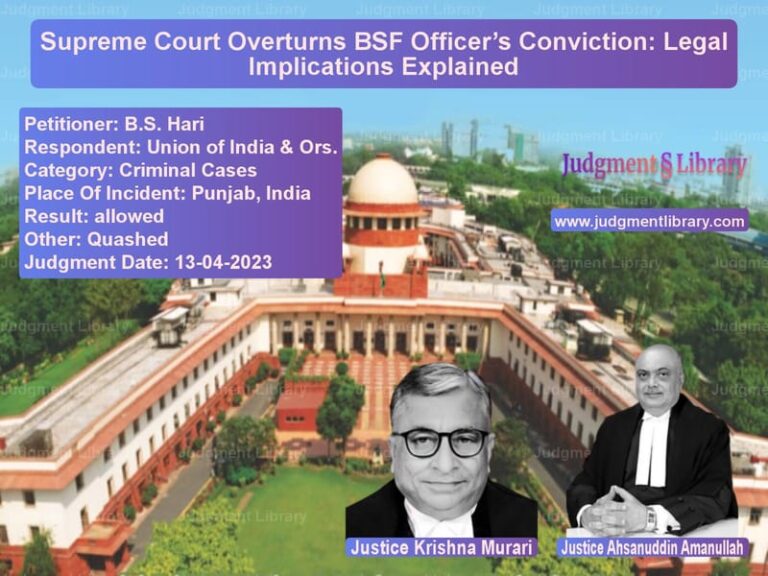Dispute Over Ownership and Tenancy in Property: G.N.R. Babu v. Dr. B.C. Muthappa Case Analysis
The case involves a property dispute between the appellant, G.N.R. Babu, and the respondent, Dr. B.C. Muthappa, concerning the ownership and the structure erected on a site in Bangalore. The appellant, a defendant in the original trial, was ordered to remove a building constructed on the property after the court declared the first respondent as the absolute owner. The appeal focuses on several legal aspects, including the service of summons, the propriety of the ex parte decree, and the rights of the tenants in the building. The case also explores the legal implications of setting aside a trial court’s judgment based on procedural grounds and the consequences of not impleading necessary parties. This blog post delves into the arguments made by both the petitioner and the respondent, as well as the Supreme Court’s analysis and final judgment.
Background of the Case
The dispute arose when Dr. B.C. Muthappa, the first respondent, filed a suit in the City Civil Court at Bangalore for a declaration of ownership over Site No. 28, which consisted of lands in Bilkenahalli and N.S. Palya villages. The first respondent claimed ownership of the property, and in addition to seeking a declaration, he demanded the removal of a structure built by G.N.R. Babu (the appellant) on the property. The City Civil Court ruled in favor of the first respondent and ordered the appellant to remove the structure, as it was deemed illegal. Furthermore, the appellant and the second respondent were restrained from entering the property. The trial court found that the appellant and the second respondent failed to appear despite being properly served summons, and thus an ex parte decree was passed. The appellant challenged the decision in the High Court, but the appeal was dismissed, which led to this case being brought before the Supreme Court.
Petitioner’s Arguments
The appellant, G.N.R. Babu, raised several points in support of his appeal:
- Incorrect Service of Summons: The appellant argued that the summons issued to him for the suit was not properly served. He pointed out that the address mentioned in the cause title was incorrect and that, at the time of the suit’s institution, he was residing at a different address. This, according to the appellant, led to a failure in the service of summons and thus invalidated the ex parte proceedings.
- Involvement of the Tenants: The appellant argued that the suit sought the demolition of a multi-story building he had constructed on the suit property, which was already occupied by purchasers of the premises. The appellant contended that the tenants should have been made parties to the suit, as they would be affected by the court’s decree.
- Grounds for Remand: The appellant also sought a remand of the suit for fresh adjudication. He emphasized that the trial court’s order for the demolition of the structure was drastic and not justified, especially given that the tenants were not made parties to the suit. He contended that this omission made the decree unfair.
- Inapplicability of the High Court’s Decision: The appellant also challenged the High Court’s application of the law, arguing that the High Court erred in stating that issues regarding the service of summons could only be addressed through a Rule 13 application for setting aside an ex parte decree.
Respondent’s Arguments
The first respondent, Dr. B.C. Muthappa, presented several counter-arguments:
- Proper Service of Summons: The respondent argued that the appellant had been properly served summons, and the failure to appear in court was not due to improper service. The respondent pointed out that the trial court had proceeded on the basis of the appellant’s absence, which had been justified under the applicable legal provisions.
- Valid Ownership of the Property: The respondent further argued that they had established ownership of the suit property through the proper legal procedures. The respondent emphasized that the appellant’s claims to the property were based on an incorrect sale deed and that the trial court had rightfully dismissed these claims.
- Correct Legal Procedure Followed: The respondent also contended that the trial court had followed the correct legal procedure in declaring ownership and ordering the removal of the structure. The decree passed was in accordance with the law, and the High Court had rightly confirmed it on merits.
- Reliance on Precedent: The respondent relied on previous judgments, such as Bhanu Kumar Jain v. Archana Kumar, which held that an appeal against an ex parte decree could only challenge the decree on its merits and that issues regarding summons could be contested under Rule 13 of Order IX of the CPC, not in the appeal.
The Court’s Reasoning
The Supreme Court, after considering the arguments from both sides, made several important observations:
- Service of Summons: The Court acknowledged the appellant’s claim of incorrect service of summons and noted that the trial court had not verified the correctness of the appellant’s address. The Court emphasized that the trial court had failed to follow the appropriate procedure under Rule 17 of Order V of the CPC, which requires a summons to be affixed if the premises are locked. The Court found that this omission could have impacted the appellant’s right to a fair hearing.
- Tenancy and Property Ownership: The Court observed that the appellant had constructed a multi-story building on the suit property, which was occupied by purchasers of the premises. The Court agreed with the appellant’s argument that the tenants should have been made parties to the suit, as they were directly affected by the decree for demolition.
- Ex Parte Decree: The Court noted that the appellant had not filed an application under Rule 13 of Order IX of the CPC to set aside the ex parte decree. However, the Court observed that the appellant was still entitled to raise the issue of improper service of summons in the appeal, as provided under Section 105 of the CPC. The Court found that the appellant could argue in the appeal that the trial court should not have proceeded ex parte against him.
- Remand of the Case: The Court agreed with the appellant’s request for remand and observed that the trial court had not addressed the issue of tenants occupying the premises. The Court also noted that the decree for demolition was drastic, especially without considering the rights of the tenants. The Court decided that the case should be remanded for a fresh adjudication.
The Court’s Decision
The Supreme Court passed the following orders:
- Setting Aside of the Decrees: The Court set aside both the judgment and order passed by the High Court on 22nd March 2016 and the trial court’s decree dated 19th September 2015.
- Restoration of the Suit: The Court restored the original suit (No. 6610 of 2014) to the file of the City Civil Court, Bangalore, and directed the trial court to proceed with the case.
- Payment of Costs: The appellant was directed to pay costs of Rs. 2,00,000 (Rupees two lakhs) to the first respondent as a condition precedent for continuing with the case.
- Written Statement Deadline: The Court directed the appellant to file his written statement within one month from the date of the order, without any extension of time.
- Priority in Disposal: The trial court was directed to give priority to the disposal of the suit, considering its long pendency since 2014.
Conclusion
This case highlights several important legal principles, including the proper service of summons, the rights of tenants in property disputes, and the procedures involved in challenging an ex parte decree. The Supreme Court’s decision to remand the case for fresh adjudication underscores the importance of ensuring fairness in the judicial process, especially in complex property disputes involving multiple parties. The case also emphasizes that the remedy for improper service of summons is available through an appeal, and that tenants’ rights cannot be overlooked in property-related lawsuits.
Petitioner Name: G.N.R. Babu @ S.N. Babu.Respondent Name: Dr. B.C. Muthappa & Ors..Judgment By: Justice Ajay Rastogi, Justice Abhay S. Oka.Place Of Incident: Bangalore.Judgment Date: 06-09-2022.
Don’t miss out on the full details! Download the complete judgment in PDF format below and gain valuable insights instantly!
Download Judgment: g.n.r.-babu-@-s.n.-b-vs-dr.-b.c.-muthappa-&-supreme-court-of-india-judgment-dated-06-09-2022.pdf
Directly Download Judgment: Directly download this Judgment
See all petitions in Contract Disputes
See all petitions in Property Disputes
See all petitions in Damages and Compensation
See all petitions in Debt Recovery
See all petitions in Judgment by Ajay Rastogi
See all petitions in Judgment by Abhay S. Oka
See all petitions in partially allowed
See all petitions in supreme court of India judgments September 2022
See all petitions in 2022 judgments
See all posts in Civil Cases Category
See all allowed petitions in Civil Cases Category
See all Dismissed petitions in Civil Cases Category
See all partially allowed petitions in Civil Cases Category







